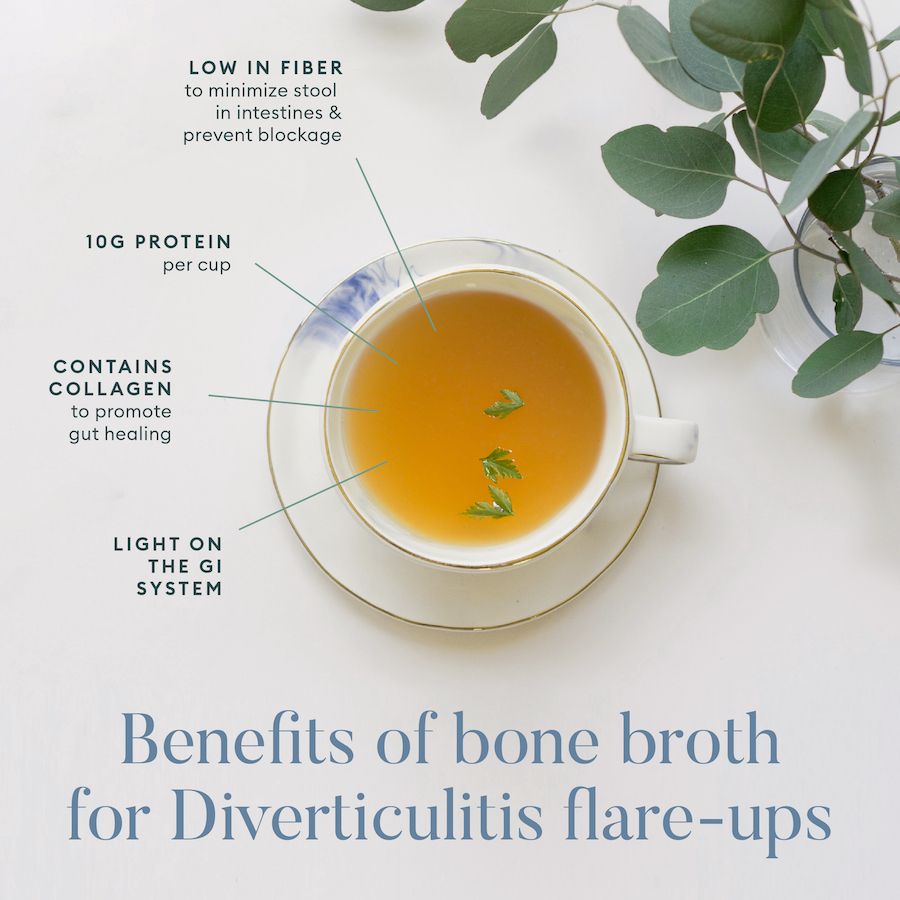If you have diverticulitis, you know how painful flare-ups can be. However, your nutrition choices can help you tame these unpleasant attacks, and keep them from ever coming back. Here’s how to effectively implement the diverticulitis diet for fewer flare-ups.
What is diverticulitis?
Diverticulitis is an inflammatory condition of the digestive tract. It starts when small, bulging pouches or sacs (diverticula) develop in the lining of the lower part of your colon. Though the underlying causes of diverticulitis are unclear, the pouches form when weak spots of the digestive lining protrude outward. This doesn’t always cause symptoms, but diverticulitis occurs when particles of stool or undigested food get stuck in diverticulum. Bacteria then starts to build, which leads to inflammation and infection. In some cases, diverticulum can even rupture.
When the sacs become inflamed, you’ll likely experience a range of unpleasant symptoms. “As the sacs grow, they put an increasing amount of pressure on the walls of the intestine, leading to pain, gas, abdominal discomfort, and other diverticulitis symptoms,” says Helaine Schonfeld, a nutritionist and health coach formerly at Parsley Health in New York City. Constipation, nausea, vomiting, and fever can also occur.
This onset of symptoms is often called a diverticulitis “flare-up” or “attack.” Abdominal pain, in particular, can last several days, according to the Mayo Clinic.
Certain diet and lifestyle choices can increase your chances of developing diverticulitis, including:
- Obesity
- Smoking
- Lack of physical activity
- A diet high in processed foods and low fiber foods
- Use of steroids, opioids, and/or nonsteroidal anti-inflammatory drugs (NSAIDs)
- Low-grade inflammation
- Gut dysbiosis, alterations in the gut microbiota
Your risk of diverticulitis also goes up after the age of 40, Schonfeld says. Still, research published in 2018 in the journal Acta Biomedica shows that diverticulitis is showing up in younger people as well.
In some cases, diverticulitis can cause serious complications, such as peritonitis (an infection that has spread to the lining of your abdomen and requires immediate medical attention) and rectal bleeding, according to Harvard Health. So, be sure to see your doctor right away if you experience any symptoms of diverticulitis.
Nutrition is key for managing diverticulitis
One of the best ways to minimize flare-ups is to dial in your nutrition. Research published in the journal Gastroenterology shows that diverticulitis is especially common in people who eat Western diets. These diets typically lack high fiber foods and are high in red meats and processed foods.
Red meat, for example, may cause long-term inflammation in your body, which may play a role in diverticulitis, according to researchers. Meanwhile, not getting enough fiber can increase the pressure on your colon as stool passes through, increasing your risk of creating more sacs, and of developing diverticulitis.
Thankfully, researchers also found that short-term dietary changes can lower your risk of diverticulitis.
Parsley Health frequently works with members who have diverticulitis to help them minimize flares and manage them when they do happen by adjusting their diet, lifestyle, and supplement routine. A specific diverticulitis diet can often help.
Try these nutrition strategies to keep diverticulitis flare-ups at bay.
Diverticulitis diet tips
1. Start with a liquid diet for diverticulitis
If you have a flare-up—or you’re recovering from one—your doctor may recommend following a clear liquid diet for a couple of days to help your digestive system heal. Liquids are low in fiber, which can help minimize the amount of stool in your intestines, and may prevent more blockage, Schonfeld says.

Try fresh juice (no pulp), and bone broths made from grass-fed beef, pasture-raised chicken, and wild fish. “[Bone broth] is light on the GI system, has about 10 grams of protein per cup, and contains collagen, which promotes gut healing,” Schonfeld says.
When you’re able to eat solid foods, look for low-fiber options, such as low-fiber cereal, canned or cooked fruit and veggies (no seeds or skin), eggs, and white bread and rice.
2. Slowly introduce more fiber
Dietary fiber may be especially helpful for preventing future diverticulitis attacks. So, once your symptoms improve—usually within two to four days—the University of California San Francisco Medical Center recommends adding 25 to 30 grams of fiber to your diet per day. “Fiber found in fruits, vegetables, and beans have the most protective effect,” Schonfeld says. Brown rice, whole-grain bread and cereal, and nuts and seeds are also good sources of fiber.
Fiber helps soften your stool, which allows it to pass through your digestive system more quickly and easily. This reduces the pressure on your colon, helping prevent diverticula from forming in the first place. In fact, one long-term study in the BMJ found that women and men who ate a high-fiber diet had a 41 percent lower risk of diverticular disease than those with a low-fiber diet.
If you’re not already eating a high-fiber diet, slowly work your way up to 25 grams of fiber per day if female, and 38 grams per day if male at a minimum. Your Parsley health coach will help you determine the right fiber intake for you.
3. Adopt a balance diet
Whether or not you’re recovering from a diverticulitis flare-up, your ultimate goal should be to adopt a balanced diet. This often includes plenty of fruits, vegetables, whole grains, and lean proteins. When possible, avoid red meat, especially unprocessed red meat.
4. Get plenty of fluids
To help move all that fiber-rich food through your GI tract, it’s important to drink plenty of fluids throughout the day, explains Schonfeld. Though fluid needs vary from one person to the next, a rough guideline of nine to 13 eight-ounce glasses of water per day.
And while water is ideal, there are other ways to increase your fluid intake—while scoring extra health benefits. For example, drinking warm ginger tea two to three times per day may lower inflammation and aid digestion, Schonfeld says.
5. Explore probiotics
While more research is needed, probiotics—“good” bacteria that resemble the microorganisms that live in your digestive tract—may help restore balance to your gut, reducing diverticulitis symptoms. When your digestive tract is healthy, the digestion process is able to move smoothly, which can help prevent the constipation that often creates new sacs in your colon.
Plus, probiotics have anti-inflammatory effects, which may help to ease inflammation from diverticulitis.
Probiotics are available in supplement form, but they can also be found in certain foods, such as yogurt, kombucha, and fermented vegetables. Schonfeld recommends incorporating a couple of tablespoons of these gut health foods (she suggests fermented foods like raw sauerkraut and kimchi, and unsweetened coconut or almond milk yogurt) into your daily diet for diverticulitis improvement. “Make sure they are raw, as heat will destroy the beneficial bacteria,” she notes.
If you’re experiencing a flare-up, hold off on taking a probiotic supplement until you can talk to your doctor. With so many probiotics on the market, Parsley Health doctors help members find the right bacterial strains and doses for their needs.
Takeaways
Diverticulitis is often caused by dietary and lifestyle choices, and it can impact overall gut health and cause digestive and kidney diseases. To combat diverticulitis, consider adding more high fiber foods, probiotics, and liquids to your normal diet. For support, a doctor or health coach can guide you through dietary changes to prevent diverticulitis flare-ups.



